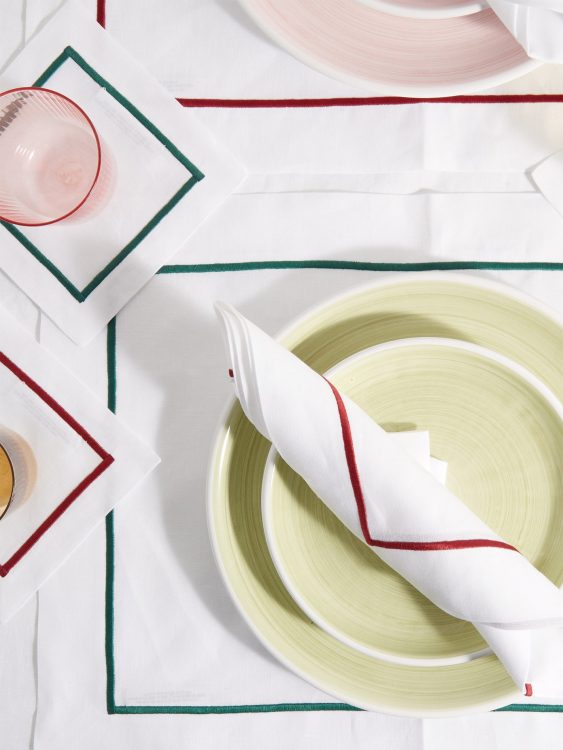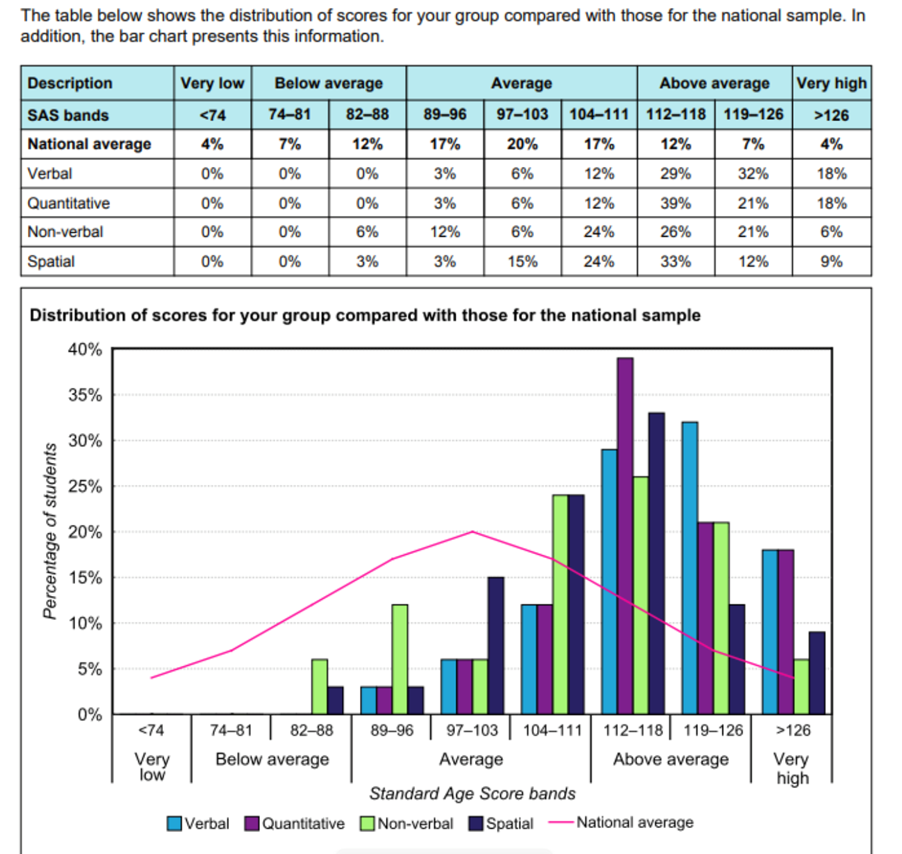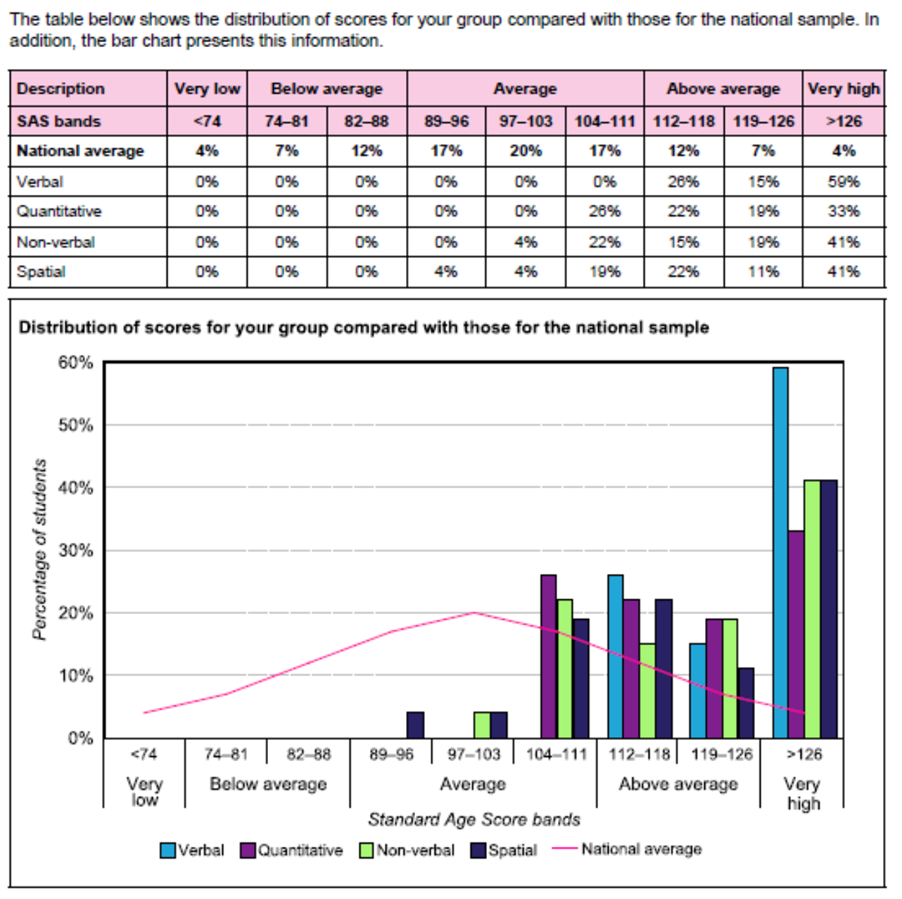How to build a strong brand identity
Roberta Zaccaria and Sara Mirone, WGDS founders, have given an interview to ICCIUK about how good digital design and efficient architecture play an instrumental role in building a strong brand identity and, consequently, a company’s growth and success.

Brand Identity
Q: With an ever more increasing shift towards digitalisation, you give digital services that have now become fundamental for a company’s establishment and growth. Could you explain what your services consist of and how design and architecture play a fundamental role in what you do?
WGDS helps businesses to navigate their digital transformation with bespoke web & marketing solutions. We offer various services: Brand and Marketing Strategy, Web Development, Digital Brand Audit, Google Analytics data analysis, SEO (Search Engine Optimization) and Content optimization to support businesses’ growth consistently and organically.
When a brand comes to us asking for help with rebranding, usually a website remake/makeover, we start by studying the business mission and vision, what are the business goals, what problems the website has to solve and what functionality the website needs.
We approach the project with the same mentality as an architect will do: what type of business will be occupying the space (digital in this case) and how the foundation of the house (website) needs to be for future goals (e-commerce, for example). Then we propose a website that reflects the brand identity and offers the best structure considering future developments. Once the website is online, we deliver Brand Strategy Guidelines to enforce brand awareness and a Digital Road Map for the following six months.
Creativity & Design
Q: While creativity plays a major role in helping a company build its unique brand personality, functionality is an essential item in the design formula to guarantee users’ accessibility. How do you let creativity and design functionality coexist?
Graphic design is a perfect marriage of creativity and function. As creativity is a key ingredient to ensure that the brand website stands out from the crowd, functionality is the key ingredient to ensure an efficient user experience and a clear call to action. Both are essential parts of website planning. For example, if you have a page that looks beautiful but it confuses your users, and they leave without filling out a form or buying something, that page is not doing its job. At the same time, you can have a perfectly functional page, but your brand identity is not represented in full (bad quality pictures, incoherent colour scheme, not clear purpose message), so the user will leave without completing any action. As architects do for a building, when we start any website project, we always think about function first and then integrate it with the ‘sexy’ and appealing look.
Sustainability
Q: Nowadays, sustainability represents a crucial aspect of a company’s success. How does sustainability fit into your digital spaces?
Indeed, sustainability is now the key driver for innovation. Today more and more consumers and investors are thinking beyond price and quality. People started caring about how and if a pair of jeans is made abroad or with zero footprints or if the food is ethically sourced. Investors care about and support companies with an ethical approach.
As sustainability is becoming a must, it needs to be integrated into the Digital Marketing Strategy with successful storytelling that speaks to your audience.
We promote sustainability; we love to work with brands to help them enlighten their sustainability close to their purpose. Whatever your business’s sustainable approach is, using local artisans, supporting a cause, looking after your employees’ well-being or recycling, this should be part of your brand and marketing strategy.
Digitalisation
Q: The digital world is an unstoppable space, continuously evolving and acquiring new forms and design trends. How is WGDS keeping up with this continuous evolution and, at the same time, able to offer the market’s latest trends to satisfy its clients?
It’s important to be updated on marketing trends, know the last social media channels, and recognize which one has more engagement or what is the latest Artificial Intelligence app on the market. Said that the crucial thing is to understand the needs of the client and offer the most appropriate platform, strategy and trends.
For example, Snapchat and Tik Tok are two of the latest trends in social media, with a majority of their users between 16-24 years old, so it wouldn’t make sense for a brand that sells products targeted to middle-aged business managers to use them.
As digitalisation is really unstoppable, especially in the last two years, companies must rethink their strategy to keep up with consumer behaviour, rapidly shifting from in-store to online shopping.
Some of WGDS’s last Projects ZainoFood, Proseccocaffe, Akub restaurant, AWM, Cabbiavoli Estate, RF Fitness, Rusi Designs, Il Circolo London, WorkSpa Wellbening Services for Corporate, Open Stent Solution Marketing Strategy for Cornelis Valve Fundraising, Moving to Italy.
The benefit of Digitalisation to the Education sector
We are happy to start a new series of interviews on how digitalisation has impacted Brands and People. We had the pleasure to interview two top independent, co-ed schools in London, Latymer and Alleyn’s. Today we are happy to share the conversation between Sara Mirone and Simona Tappi from WGDS with Natasha Nolan and Caroline Roberts from Latymer Upper.
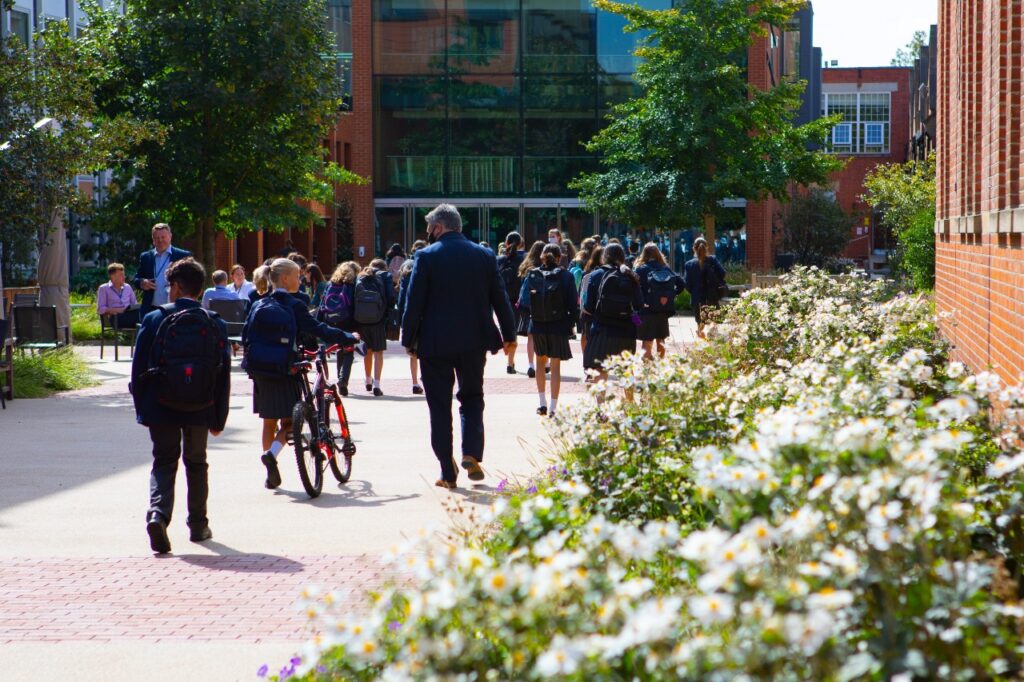
How has digitalisation changed your mode of communication?
Thanks to a long process of digitalisation, our mode of communication has become better and more efficient with the outside world.
Over the past decade, Latymer Prep and Upper Schools and the Latymer Foundation have been evolving their platforms following the digital transformation enabling accessible and immediate communication with the Latymer Community whether you are a parent a donor or an alumni.
1. Parents
First, in 2015 the Prep and the Upper Schools moved parent and student communications to the SchoolPost system. This platform removes the need for printing paper forms which are sent home in school bags and instead enables secure two-way communication between the School and our parents and/or students. As well as emails and SMS messaging, a major benefit is that the school can create customised reply and/or consent forms which parents can complete and return online, making the process much more efficient and straightforward for parents and the Schools.
Later in 2019, the SchoolPost system has been complemented by our Latymer Parent Portal. This MSP (My School Portal) platform is a user-friendly dashboard that enables parents to have instant access to information about their child’s education, sport and activities. The integration of the Parent Portal and the SchoolPost systems was a natural step to permit the parents to keep track of all their communications in one place.
Similarly, we are constantly reviewing our engagement with our other platforms, namely our website and social media, and are increasing our production and use of video format to document school life and amplify our students’ voices across these mediums.
2. Donors
Last October, we sent out our main physical mailing to fewer segments than in previous years, which has reduced costs. As a result, we found that younger alumni responded better to an appeal by email than by mail. However, people do keep physical brochures and gift forms and often send in donations months later, so we will maintain the physical element of the mailing. We follow this mailing with a series of e-appeals, the first one being in the next few weeks.
Traditionally, we would send physical thank you letters to our donors, but during the pandemic that wasn’t possible, so we moved to send the letters via email. We found that donors responded more often to an email than to a mailed letter, so we have continued to send letters via email, again digitalisation helped us!
3. Alumni
We use the social networking platform Graduway to communicate with our alumni community. Our version is called Latymer Connects. We have just over 3,000 members although our weekly Latymer Connects alumni newsletter reaches around 5,000 alumni. The platform includes groups around our global Latymerian Councils in various countries and universities which encourages Latymerians to contact fellow alumni for support or advice. We also have a jobs page, where alumni post vacancies and often recruit fellow Latymerians. We are in the process of developing an online digital archive with Preservica, the aim of which is to encourage our alumni to upload their memorabilia onto a platform that can be shared with the Latymerian community.
4. Fundraising initiatives
Events have always been in person, but when the pandemic hit we adapted quickly and moved whatever events we could online. We developed a new initiative, the ‘Virtually Speaking’ Series on online talks which has already raised over £30,000 for our bursary appeal and has been really popular with our students, parents and alumni. The talks enabled us to communicate with our community worldwide over the various lockdowns. Since the pandemic restrictions eased, we have run hybrid events as people join from overseas (for example, people joined from US and Australia for our last event). Last month we ran “Does Art Matter” with an in-person audience and also a live stream, with almost 100 attendees at Latymer and 50 online. People now ask if they can join online when they wouldn’t before.
We are currently planning a fundraising initiative for our Year 10 students, with all profits going to bursaries, and plan to use Google Sites as an advertising platform coupled with a donation button.
What is the best social media platform to reach both students and parents as well as potential donors?
Over the last few years, the School and the Foundation have grown their presence on social media very organically. Currently, both the Latymer Upper and Prep Schools and the Latymer Foundation have their own Twitter, Facebook and Instagram accounts and we share a LinkedIn account.
We have been working to improve and increase the quality, volume and frequency of our content and have seen a growth in our audiences and engagements. We are constantly reviewing our social media and looking at how we can improve engagement with our community and improve the ‘user journey’ so that people can easily find the information they’re interested in.
A good recent example of this is setting up Linktree on our Instagram accounts last year which has increased traffic through to our websites. The links in the bio signpost people to the content they are interested in on our websites – whether that is student/alumni successes, events, our bursary programme, Inspiring Minds campaign, our partnership work locally and/or how they can support or get involved in our outreach programmes. We use our Youtube channel as a depository for content and are also looking at how we might make this work better for us, for example, we are currently working with the Latymer Classics Society to develop a ‘Classics playlist’ that can be shared with local partner schools.
You can follow Latymer on Instagram, Twitter and LinkedIn.
At WGDS we help businesses to navigate the digital transformation by adjusting their Brand Strategy during this unusual time, any questions contact us.
I’m Mafalda from Sustainable First and I’m a #WORLDCHANGER
This week on the #WORLDCHANGERS series, we speak to Mafalda, founder of Sustainable First, a platform aiming to make the tourism industry the leading activity sector in implementing sustainable strategies through actions and strategies for moving towards a more sustainable pattern of development in tourism.
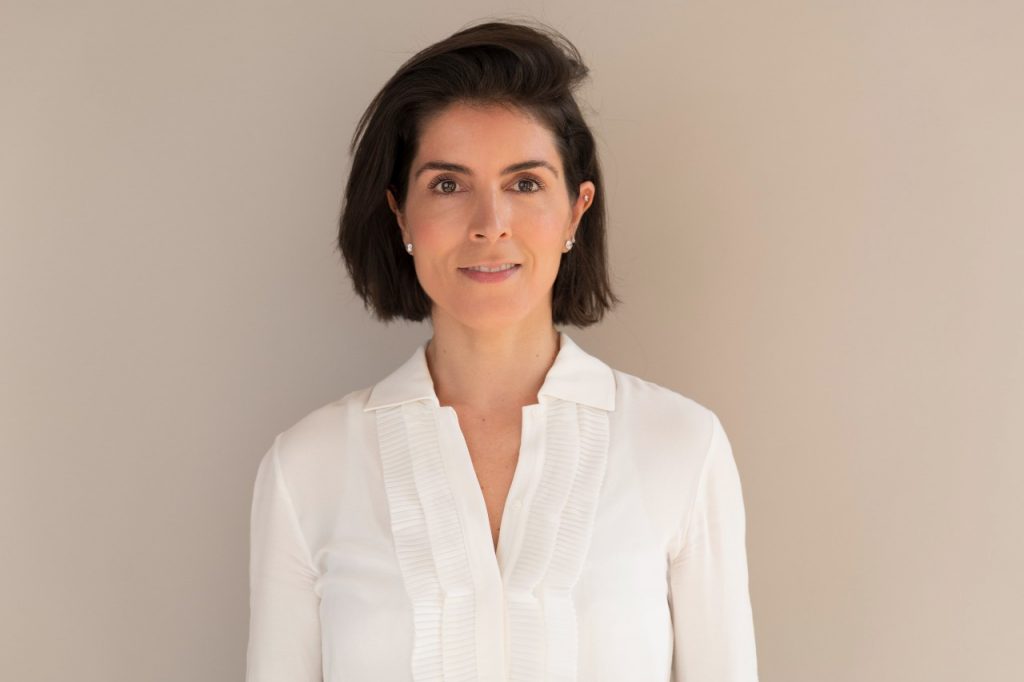
Location: Rome and London
Current job: CEO, Sustainable First
One word that best describes how you work: Efficient
My role model: I am inspired by the everyday woman, all women that relentlessly row against the tide. Too many to mention
My greatest success: Taking the leap and moving to London to study when I was 17
Something I love: My family and friends (it’s the family you choose !)
Something I hate: Lack of efficiency
My favourite country: Portugal, where I grew up.
First of all, tell us a little about your background and how you got to where you are today.
I was born in Lisbon and moved to London to study Dance, growing up I attended the National Ballet School and took dance training very seriously from age 9. I finished my degree, even if half way I decided I didn’t want to make a career out of performing, and completed a Diploma in Arts Management at UCL at the same time. Once finished I sent out 100 CVs asking for internships and CNN was one of the few companies that called me back. I started there as an intern and stayed for 13years! I developed a passion for the Tourism industry while working at CNN building our client portfolio of advertisers and sponsors from Southern Europe & CIS and travelling to these regions on a weekly basis. After leaving CNN I slowly fluctuated towards working in travel & tourism and I am thrilled to be finally 100% dedicated to this fascinating, ever evolving, industry.
When did you have the innovative idea about Sustainable First?
The idea came from one of many brainstorms with whom is now my business partner, Bernard Metzger. We had it in Saint Petersburg while attending the General Assembly of the UNWTO (UN World Tourism Organisation) where we were asked to join a panel of judges to choose winners of a tourism video competition. The sustainable tourism category had the most amazing stories that we had never heard of, of projects having a real impact in their local communities. At breakfast, the day after the judging, we started brainstorming about how to bring those stories to a wider audience… and Sustainable First was born.
How was the process to find partners and get the Sustainable First platform live?
I was lucky that my business partner had already registered SustainableFirst.com over 20years ago “just in case” he wanted to do something with it one day… he’s a visionary really. So, we had the domain, and from then on, once the look and feel was right and the interface was up, we have been building content ever since. We have the most amazing partners, they are organizations who’s work I have admired for years. Some of them I already knew the CEOs, some others I reached out to explain what we were trying to build and our vision and they were amazing to come on board and support what we are trying to do. At the end of the day, we are all working towards the same goals.
How did you adjust your business in this unusual time?
As most of the team is based in Asia, I was already working remotely so that didn’t change much. What did change is that I have young twin boys that were suddenly at home, the whole day, when London went into lockdown and schools shut. That wasn’t a smooth transition – it can’t have been easy for anyone! I am blessed that they were old enough that I could slowly empower them to be more independent (instead of calling out my name every 10minutes) so that we could all get on with our work. I will be forever grateful to the teachers that tried to keep some sort of normality and managed to keep them engaged and teach them something while working remotely…
How do you see the tourism sector reshaping in the next few years?
I see such a massive change already taking place, this pandemic has created a need for everyone to take a look at their lives and their relationship with the world that surrounds them. Sustainability was already in the mind of the industry and the traveller but this was accelerated by COVID19. I don’t have a crystal ball, but I do already see a tendency for “back to the roots”, more interest in authentic “real” experiences where travellers are more curious and interested in local communities and leaving little impact behind.
How can Sustainable First contribute to the reshaping of the industry when we will be able to travel again?
We feature truly sustainable tourism businesses and destinations, we tell the story of the impact these have in their local communities and link that with the UN Sustainable Development Goals they are working towards. We want to inspire travellers and the industry with these amazing stories, making them lead by example.
You are very active in defending women rights, fighting to have full and effective participation in public life, what is your involvement?
Thank you, you are very kind. I always feel that we never do enough, there is SO much to be done and I truly believe that together, we can make a difference. I have been involved with women’s empowerment NGOs for some time and am now focused on UN Women, where I am a Special Advisor to the UK Executive Director, Claire Barnett, a fierce leader who I truly admire.
How do you recharge? What do you do when you want to forget about work?
I meditate for 20 minutes every morning and feel that doing so really energises me for the day. I used to hate meditating and used to end up doing to-do lists or falling asleep every time I tried… I didn’t know how to do it and once I’ve learned how to do it and have introduced it in my routine, I love it.
What is your daily action to preserve the environment?
I am a big believer in education, and focusing on giving our youth the tools, the data, the facts they need so we can empower them to imagine the world they want to live in. Once they do that, they then have something to focus on and work towards. I spend a lot of time talking about different environment related issues with my 9 year olds. It is fascinating to hear their thoughts and I learn so much from them and from the questions they pose and how they look at things. That goes beyond the usual avoidance of single use plastic, energy saving, waste composting etc…
Last but not least, what is the best place you would recommend for a relaxing and sustainable holiday?
So many beautiful places to escape to! I don’t think I could choose one… Instead I would recommend that the next time you go on a break, no matter how close or far you travel to, go with a different attitude and an open heart and mind. Talk to the locals, if you’re staying in a hotel, go and try the local restaurants. Try the local produce and help the local economy. And be mindful of local cultures and the environment, try to leave no trace behind. Sustainability touches all aspects of our lives and we’re all in this together, aiming to preserve the world we live in.
You can follow Mafalda on Instagram , Twitter and LinkedIn.
We love to interview #WORLDCHANGERS, and listen about their challenges and their achievements. Are you a Brand keen to invest in Digital? We can help you analyse your digital presence, such as Google Analytics data, to understand where your visits come from, who your users are, and which are the most visited pages. After this deep analysis, we can support you to optimize your Brand Strategy to reach your business goals, choosing where to allocate your digital budget.
I’m Veronika Covington and I am your #STEMPRO
This week on the #YOURPRO series, we speak to Veronika, co-founder of Little House of Science, a company that organizes Children’s Science Education including Holiday Camps and weekend STEM clubs, After-school Club, Workshops and Outreach (live and video) and Publications.
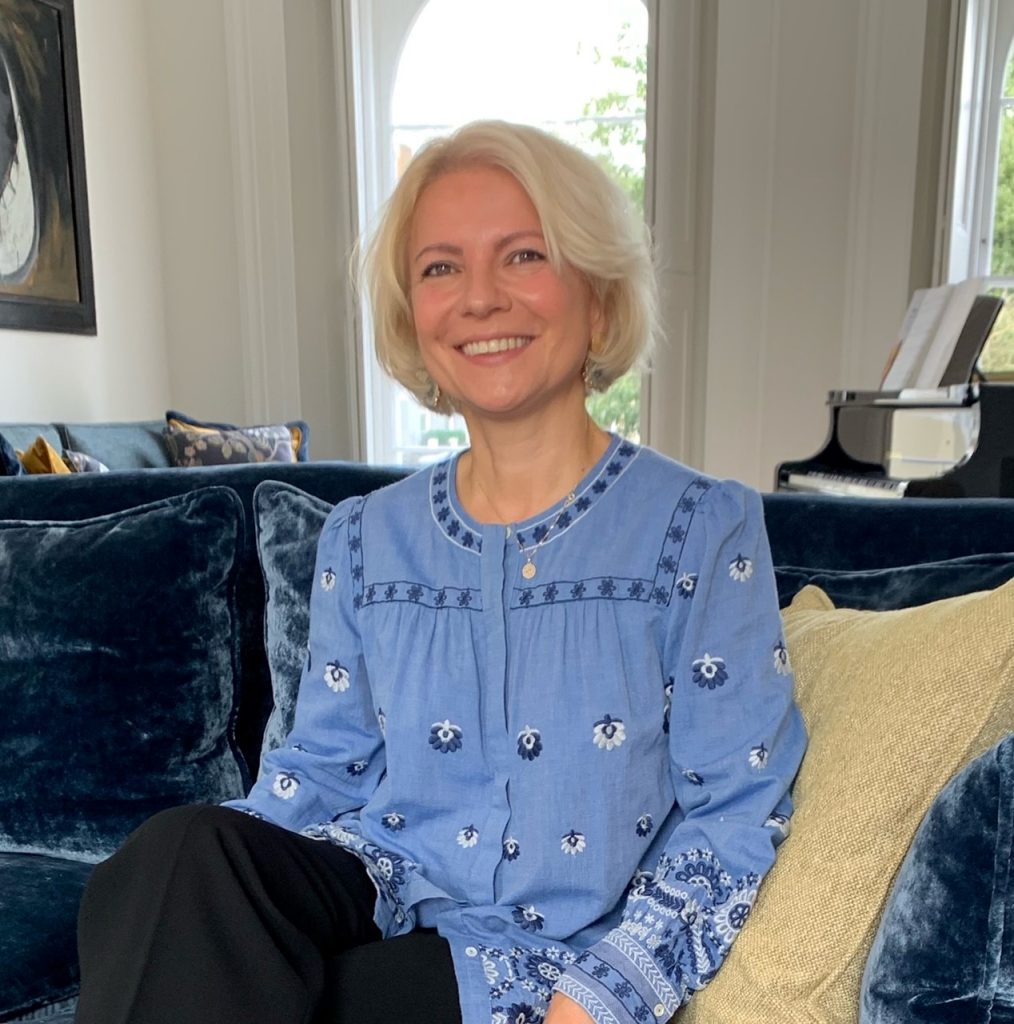
Current job: Co-founder Little House of Science
One word that best describes how you work: passionately
My role model: Ruth Bader Ginsburg
My greatest success: having my two kids
My favourite school’s subject: I loved all; English was one but , Biology was probably my all time favourite in high school.
My biggest fear: at the moment is what climate change will have in store for us and the future generations.
My life dream: I am very happy with my life and how it has turned out so far. I have two beautiful children both of whom I am extremely proud of and a wonderful husband. Also, I dream of a future which will be environmentally stable and where our planet will be able to recover again.
My favourite food is – I am pretty much plant based in my diet but I do love goulash and wiener schnitzel
First of all, explain to our reader what STEM stands for and when your love for scientific subjects started, giving later the idea to found Little House of Science
STEM stands for Science, Technology, Engineering, Mathematics. When I was at university I took several science subjects but I ended up graduating with a business degree. My husband is a physicist and mathematician by education- and we ended up becoming very involved in supporting the UK science community many years ago (he was Chair of the UK’s mathematical research institute in Cambridge, The Newton Institute, Trustee of Science Museum, Chair of The Alan Turing Institute) and I realised although there is so much for adults to be involved, there was nothing for children outside of the school curriculum to learn more about science. Along with my wonderful business partners Liliana – and Elisabeth we decided to set up Little House of Science to fill this gap. We now teach thousands of children each year. I am working on our start in publishing, where we are launching our first book “This Book is full of Brains”- coming out in October, which you can pre-order at Waterstones.
What is exactly Little House of Science and in what is different from others way to learn science?
Little House of Science is a science education company which specialises in after school clubs, holiday camps, science weeks, outreach programmes for children aged 3 to 12 years (live and now also live video classes since COVID). We teach over 4000 kids a year with a very hands on approach demonstrating that science is everywhere around us. We teach in a project based way and every week children will have a new topic selected from for example biology, chemistry, physics, engineering. We integrate maths wherever its applicable and also offer workshops on Artificial Intelligence and Computing.
With Little House of Science we are able to give back and nurture childrens knowledge in understanding the world around them. We hope to equip those we teach and the next generation with a wider and deeper scientific understanding and appreciation.
How is it challenging to engage with students so young?
Kids are amazingly bright. They are by nature extremely curious and they are natural scientists – they ask so many questions about how the world works and they try to figure out the answers and solutions to problems. It is very engaging to teach young children. We teach each of our workshops, camps and programmes based on our pupils age groups. Our nursery students may have different demonstrations and take homes then when we are teaching year 6 for example. Our teachers at House of Science are fantastic at working with different age groups.
When I took my Master in Electronic Enginnering we were only 7% female students, do you believe that lately there is a change in thinking that girls are less ‘gifted’ for STEM subjects?
My personal opinion is that girls generally have always been just as gifted or good in science as anyone else. It is just that there seems to have been a stigma and stereotyping attached to it which has made some girls feel like they should be studying something else or that they are not as good. This takes some time to change along with re-education and spreading the message that girls are great in STEM subjects!
Before people were so concerned about climate change and pollution, you had already supported and worked with Client-Earth, how did it all begin?
My husband and I have been supporting and working with Client Earth, a leading environmental law firm and charity with 200 lawyers and offices in London, Berlin, Poland and China using the power of the law to protect life on Earth, for over 8 years. We also set up the Development Board back then to help grow Client Earth and get the word out. I am on the Development Board and my husband Howard is Chairman of Client Earth . When we started to become involved, climate change was not a topic so many people thought about as the world felt much more stable. It felt very distant to many. However, the scientific research behind the changes – ie increase in CO2 emissions, loss of biodiversity, chemical and air pollution, the warming up and acidification of the oceans was already there. Scientists were trying to make themselves heard. It was already very clear that countries, companies, individuals needed to make changes urgently to how we live and operate on this planet.
There is a project of Client Earth that you are particularly proud of?
Client Earth covers many areas including protecting forests, transitioning to clean energy, eliminating fossil fuels and use of plastics to name a few. Air pollution is also a very big area. 90% of children globally breathe toxic air- leading to smaller lungs, asthma, increased mental health problems to name a few. Millions of people die globally as a result. Client Earth has sued the UK government successfully in ground breaking court cases here in the UK, pushing for ambitious action. It is also doing this across Europe. The lawyers work extremely hard to make our cities and planet a better, cleaner place.
You follow so many projects, how do you find the right work/free time balance in your day?
Its always tricky balancing family and work and limited time. I do most of my work when my kids are at school and my business partners, Elisabeth and Liliana, are also wonderful to work with. I am very lucky as we all work very closely together and one of my roles is collaborating with schools in London and their club and education programmes. Due the pandemic, we now teach live video classes and clubs across the globe without commuting saving precious time with our family.
Last but not least, as #Stempro, what are the Little House of Science courses you suggested every child should do to make them passionate about Science?
Children love so many of our classes- some of the topics include – Chemical Reactions, Fascinating Frogs and Amphibians, Forces and Flight, Cell life and DNA, What is Biomimicry?, Galileo’s Big Ideas, Our beautiful Oceans, Engineering and Architecture, the list is long.
Now please fill the gap about your 5 pro tips:
- Best subjects of Science for beginners- Children can start our clubs or camps at any time-they are independent sessions each time. But some great topics to learn about and some of my favourite are Miraculous Microorganisms, Amazing Chemicals, Optical Illusion, Who was Archimedes, Beautiful Bees to name a few!
- Best place for summer holiday- There are so many beautiful places to go to! We love being on our farm in Sussex and for the summer holidays we spend as much time as we can in Austria to be in the mountains and lake district- which we love as a family.
- A sport to keep you fit. I love yoga and try to get better at it all the time- and I love running.
- A game for your brain- trying to learn bridge!
- A book to read One of my favourite books Wilding by Isabella Tree
You can follow Little House of Science on Instagram
At Wegiveit we help businesses to navigate digital transformation by studying your google analytics and media insights, adjusting your Brand Strategy. and offering advice on how to implement your cause marketing into your overall marketing strategy. Contact Sara to learn more.
I’m Gregory from Sissi Fabulous Food and I’m #YOUREVENTPRO
This week we are interviewing Gregory Schaad-Jackson who together with his mother Sissi have created Sissi Fabulous Food, a London-based boutique catering company that offers cosmopolitan and delicious food cooked with the best ingredients. Gregory explains how Sissi was born and how they have adjusted the business to this unusual time.
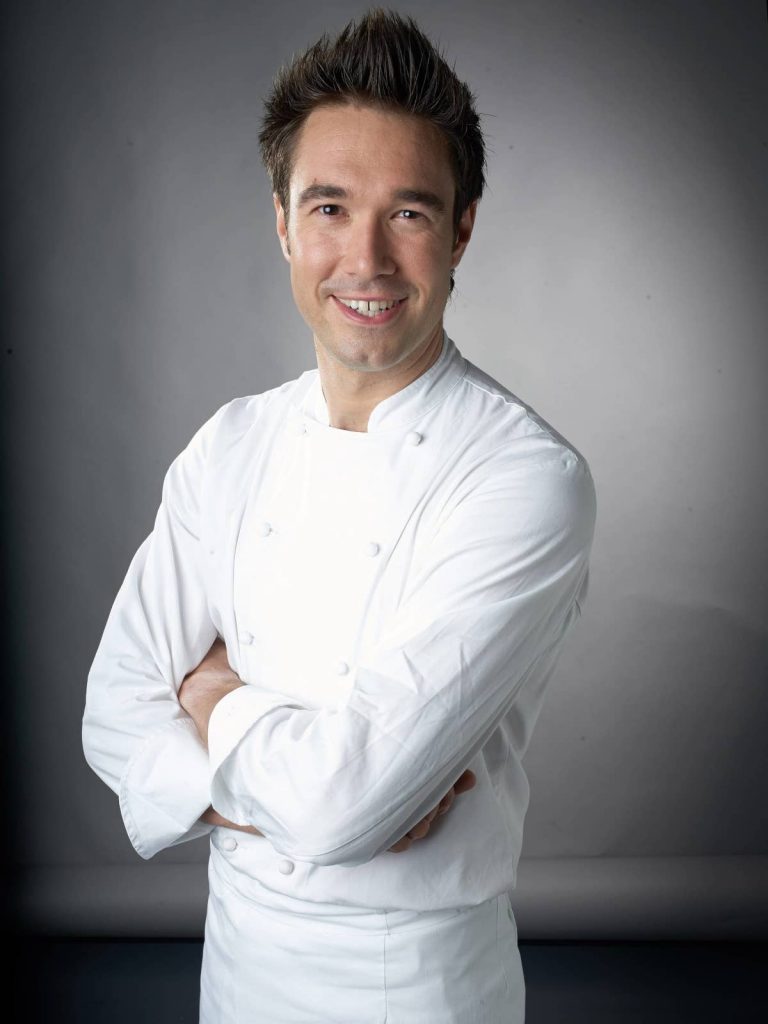
Business description: Event/party catering in and around London, as well as Europe ( Geneve, Saint-Tropez, Vienna, Sotogrande)
Current job: Sissi Fabulous Food Executive Chef & Operations Director
One word that best describes how you work Personably
My greatest success in life is Catering the PAD London Art Fair for 10 consecutive years
My biggest fear is bad quality chocolate
My role model is Bill Gates
My favourite movie is The Great Escape
My comfort food is Gianduja
First of all, tell us something about you and your business.
We are a family business, with our founder & mother Sissi still very much involved since the inception in 2003, that specialises in private party catering as well as corporate and art events. Victoria, my sister trained with London’s best party planners and joined us in 2015. I joined in 2008 after having trained in London at the Savory Grill with Marcus Wareing and in New York with Gordon Ramsay, having switched from a career in Management Consulting. We like to have a personal relationship with our clients as well as with our staff, and as a result, all invest our heart and soul both into the planning of parties as well as the cooking of the food. We firmly believe that this personal touch differentiates us from many other caterers. Furthermore, as we have lived in many countries and are ourselves Swiss, Austrian and American we can also relate, share common values and understand the tastes of our clients.
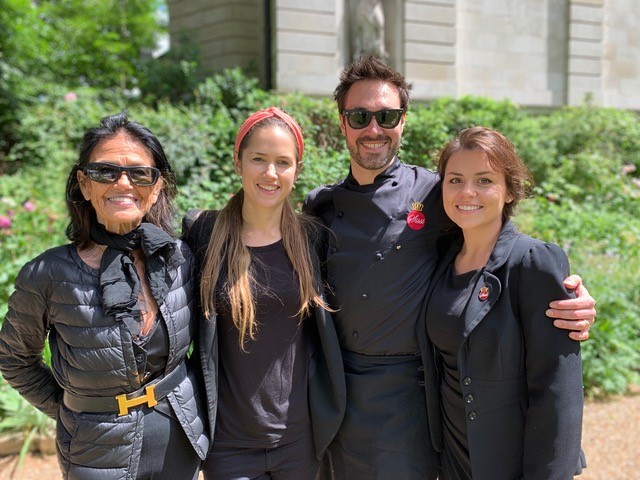
How did you adjust your business in this unusual time?
We feel it is important to be flexible at all times, and especially now, both in terms of budgets and in what we can offer in terms of products and services. As the restrictions imposed by the government are constantly being increased, clients are no longer able to have large parties. We have therefore launched an online grocery store for our clients, offering many of our most popular traditional dishes as easy to reheat ready meals. We also offer a range of wines and pantry items such as our Great Taste Award-winning Granola. We are adding cocktail mixers and elegant dinner party dishes to this.
We have also launched a Neapolitan style sourdough pizza pop up service as well as a Mobile Espresso Bar for outdoor events such as weddings or private parties, or markets.
For clients who still want to organise a fun and original social event around food, we are offering socially distanced cooking lessons for up to 5 people (6 being the current maximum at the time of writing) in our Clapham atelier followed by a dinner in our tasting room.
Maybe versatile would be a better word than flexible!
How did you manage to keep your existing clients loyal and engage with the new ones with the recent restrictions?
We have always demonstrated a can-do attitude and so have gotten a reputation to make events happen for our clients even if they come up at short notice or if the task seems impossible! As a result, we have some lovely and loyal clients who keep coming back to us over the years. We have been so grateful for these relationships. Since the lockdown, we have been posting cooking videos for inspiration on our social media pages, and are writing regular updates on our newsletter via which we inform our existing clients of our new products and services. We will offer our existing clients a recommendation reward in the form of one of their favourite desserts from our menu.
As #EVENTPRO, what do you think it’s going to be the next big thing in the catering industry?
I would like to say food trucks, but that’s nothing new.. I think maybe dinner party kits, as these have been around but have not taken off.. now with increased connectivity, these kits could be delivered to various guests who then easily prepare the food and they connect with the other guests and hosts to have a virtual dinner party – I am traditionalist though and still love the buzz of a real party taking place under one roof!
Tell us your trick to have a good work/free time balance in your day.
My mother always had an Austrian saying, which was: “do not put off until tomorrow, what can be done today”. As a result, we are a family of night owls and will work late into the night to finish any planning or work so that the following day we have more free time or at least time to react to what the day throws us!
What is your favourite recipe to cook and your secret ingredient?
My favourite recipe to cook is Truffle Linguine (fresh linguine obvs.), in under 5 min and my secret ingredient is tartufata, a wonderful aromatic truffle and mushroom paste we get from one of our specialist suppliers!
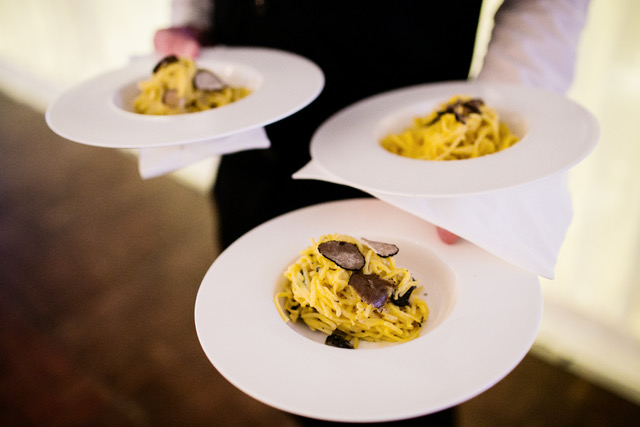
Now please fill the gap about your five pro tips:
- Your golden rule in the kitchen taste everything & season appropriately
- How to achieve your goals: set goals, plan a strategy, plan a backup, implement it. Then if you fail, take a break, reassess and try to revise the original goal to make it more realistic. It is ok to be 2nd best.
- Best place to recharge: Nature/countryside
- A sport to keep you fit Vinyasa flow yoga
- A game for your brain: flat pack furniture assembly
Follow @sissifabulousfood
At Wegiveit we help businesses to navigate the digital transformation adjusting their Brand Strategy during this unusual time, any questions contact us.
I’m John Shepherd from Partridges and I’ve been selected as #WORLDCHANGER
This week on the #WORLDCHANGERS series, we speak to John Shepherd owner of one of the few remaining family-run food shops in Central London, Partridges – a company that still cherishes its original idea of providing the very finest quality foods.
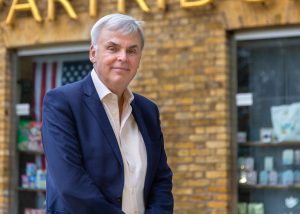
Location: Duke of York Square, Chelsea, London
Current job: Partridges Owner & Managing Director
One word that best describes how you work: Improvisationally
My role model: Clement Attlee
My biggest fear: Heights
Something I love: Padula, Italy
Something I hate: Brexit
First of all, tell us a little about your background and how Partridges began.
Partridges was opened by my brother, Richard, in 1972. I first worked at the shop in 1973 after leaving school. I was actually born under a mile away from where the shop is located today when we were living in Chelsea.
After I finished my education at Johns Hopkins Graduate School in Bologna in 1980 I returned to the shop and have worked there ever since. Although I acquired an MBA and was also working as a Magistrate part-time.
In 1972 retail food shops in the UK were moving towards self-service supermarkets and delicatessens were something of a dying breed. Partridges was something of a village store in Chelsea.
The original motto was ‘good things for the larder’ and we sold traditional British Foods like Jugged Hare, Ox Tongue and Gull’s Eggs alongside our favourite foods and wines from the Continent.
Partridges was granted the Royal Warrant as Grocers to Her Majesty the Queen in 1994, how was the journey to get to this achievement?
We started supplying the Royal Household in 1991. I had actually originally written to them asking to be considered as a supplier, but this is not always the right approach! As a matter of fact, they were already buying from us discreetly.
Normally a business has to wait 5 years before being granted a Royal Warrant but we were Granted ours in 1994. Being a Royal Warrant Holder means that you have to abide by the Lord Chamberlain’s Rules which is the Highway Code for supplying the Palace.
There is an emphasis, of course, on very high standards and environmentally sensitive products and currently, there are 3 Grantors: HM the Queen, the Duke of Edinburgh and Prince Charles.
The Royal Warrant is always Granted to an individual rather than a Business. If a business is sold the Royal Warrant does not necessarily go with it. In total there are about 800 Royal Warrant Holders and in 2007 I was appointed President of the Royal Warrant Holders Association which involves overseeing the various charity initiatives and travelling the country to meet other Warrant Holders. There is a very active social scene as well.
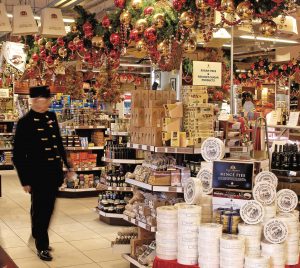
What is the secret to maintaining this unique level of quality and service?
The secret to maintaining the Royal Warrant is not a secret at all really. It is about being constantly vigilant in ensuring deliveries are on time, in good quality and anticipating problems early. Recognising the customer and the customer’s needs is the ultimate goal regarding everyone who walks through the door at Partridges – even shoplifters. When things go wrong, and they will, it is important to act quickly to put them right. Recognition and an element of surprise are two key aspects. And a good PR team to spread the word.
Today we talk more about sustainability, you were then well ahead of the time starting Startisans, how did you get the idea?
Running a food shop that just sells groceries is running between two very fine margins. It is important to innovate and constantly surprise customers with new ideas and initiatives. This is the surprise element to accompany recognition. So we have tried to introduce new initiatives into the mix. We celebrate as many major festivals as we can throughout the year, we have an American ex-pat section, we run the World Chelsea Bun Awards, we have created a range of own-label products which we export, we distil our own Chelsea Flower Gin and we created the Fine Food Market on the Duke of York Square which first opened in 2005 to help attract footfall onto the Square. The traders who attend are smaller businesses or ‘Start-Up Artisans’ which one of my daughters named Startisans. We actually ran over 20 regular markets around London over the past decade offering Startisans places to trade at a very low-cost base. Due to the pandemic, we transferred the Duke of York Square market to the historic running track where it has flourished in a socially distanced manner. We also offer Startisans a space on our website, sell some of their products in the shop and provide an Award for the Startisan of the Year at the Great Taste Awards – see Startisan.
How have you adjusted your business in this unusual time?
We have adjusted our business spontaneously, if not willingly, in reaction to Covid19 by carrying out actions that we would never have done otherwise. For example: closing the in-store Café, redesigning the shop floor layout and upgrading our delivery services by for example starting to be featured on Deliveroo. It has been a challenge to manage 120 plus staff in the time of self-isolation and track and trace and encouraging customers to change habits too. However, we have also been very lucky to be able to stay open every day so far and to be supported by loyal local customers in such good spirit.
What do you think is the next big thing in the food market?
I am not very good at spotting the next big things. Usually, they hit us on the head before we embrace them. But I see increased specialisation going forward. The Pandemic has encouraged the return of smaller independent food businesses. In one area of London we know well, a new Italian deli and a fruit and veg store have recently opened. There are now at least 9 shops selling various types of food. When we opened there were only 2. The success of these newcomers may also rely on their engagement with delivery platforms which I believe will keep expanding in London for the foreseeable future. Food technology will also become increasingly important in the quest to find greater sustainability in food production. In terms of types of food, we work closely with the Great Taste Awards where the quality and presentation of many new food products is outstanding.
If you knew then what you know now, what would you have done differently?
If I knew what I know now I would be more inclined to take risks and follow more instincts. We have kept going for 49 years but I always tend to remember the projects we didn’t carry out and the time spent treading water. Standing still is a risk in itself.
How do you recharge? What do you do when you want to forget about work?
My wife and I go to our house in Padula, Italy. I used to play in the local football team but we like travelling, and staying with our grandchildren. Personally, I am a fan of film noir, sport, writing and single malt whisky, and making pizza in the garden.
What are you currently reading, or what’s something you’d recommend?
I enjoy reading a lot. One of my favourites is James Thurber as I like the humorous approach he takes to life’s travails. One of my favourite books is the fictional “Autobiography of Fezziwig” by Danny Kuhn. He takes my favourite character from Charles Dickens ‘A Christmas Carol’ – Mr Fezziwig – and spins out an interesting life story. The reason why I like Fezziwig is that he becomes the model of Scrooges redemption. I think it has been referred to as the Fezziwig Approach. He is the hero of a Christmas Carol.
Last but not least, what is your favourite comfort food?
Comfort food, how long have you got? There is a lot of it. But pasta in many, many forms and chocolate would have to be at the top of the list.
You can follow Partridges on Instagram here.
We love to interview #WORLDCHANGERS and listen about their challenges and their achievements. We can help you to optimize your Brand Strategy to reach your business goals and to adjust your Cause Marketing Strategy to improve your social responsibility message in your digital channels.
WGDS is a London based Digital Agency who helps Small to Medium Businesses to grow, develop and succeed.
I’m Carolina from Carolina Bucci and I’m a #WORLDCHANGER
This week on the #WORLDCHANGERS series, we speak to Carolina Bucci, founder and designer of Carolina Bucci, fine and elegant jewellery pieces meticulously designed, beautifully executed.
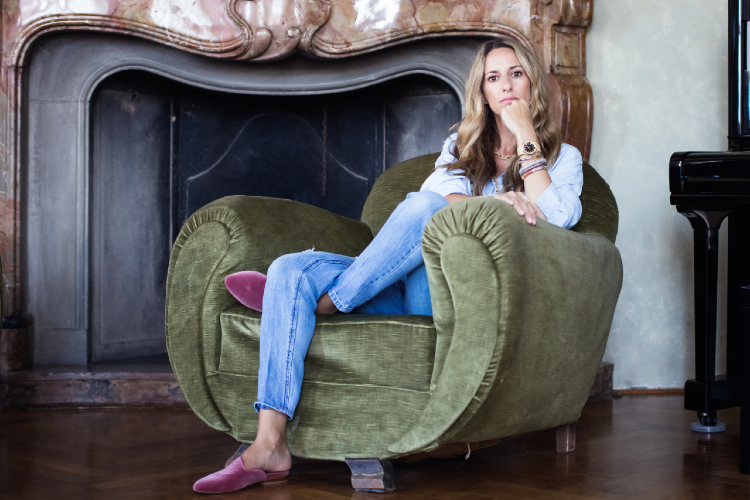
Location: London
Current job: Jewellery Designer for Carolina Bucci
One word that best describes how you work: Always
My greatest success: Pursuing and sticking with my passion
My biggest fear: I am absolutely terrified of needles
My secret wish: That smartphones were never invented
My role model: Fulco di Verdura
First of all, tell us a little about your background and how your love for fine jewellery began
My family have been manufacturing fine jewellery in Florence since 1885. I grew up visiting my father in the atelier right next to the Ponte Vecchio in the Goldsmiths’ quarter of Florence. Designing fine jewellery was all I ever wanted to do…
Was there a moment that gave the breakthrough to Carolina Bucci?
I left Florence to study jewellery design in NY. While I was studying at FIT I started to put together some ideas for what I thought contemporary fine jewellery could be. A piece here, a piece there. Nothing too coherent. One of those ideas was for a silk and gold-threaded bracelet that looked like a friendship bracelet and could be tied in the same way. Patricia Field who was the stylist for ‘Sex and the City’ saw that prototype and Sarah Jessica Parker wore one throughout the last series… after that, things just exploded.
How does inspiration come about for your creations?
All different ways – normally linked to some memory or emotion. Typically I have a sudden need to make a piece for myself and that design just appears fully formed in my head. It’s hard to explain what the process is because when I try to make it happen it normally doesn’t. If you sit me at a desk and say “design” I freeze. It’s why I could never work full time designing for anybody else.
Can you tell us an example of early life that has shaped you?
Sitting with my father at the jewellery bench and asking question after question. When it came time for me to start designing he was my fiercest critic, (and when I wasn’t in earshot, my biggest supporter), and that taught me how to articulate and defend what I wanted to make. He didn’t make things easy for me, and that has stood me in good stead for all the challenges that followed.
Can you tell us a key lesson you have learned along the way
That 10% of your efforts and output will make up 90% of your success. Accepting that allows you to move on when things are not clicking, and over the years you gain a sort of early radar for when you are moving in the right direction.
Today we talk more about sustainability, in what can Carolina Bucci be defined sustainable?
I think at its simplest fine jewellery is an endlessly recyclable category. If you don’t like your piece then you can melt it and start again. In all the talk of the luxury world, fine jewellery is a little different. It is at least thousands of years old and has carried value and prestige throughout. We have started to take serious steps towards certifying all of our gold purchasing as completely ethical. It is not a simple or quick process, but it is important to me that we are on the right path and improving year by year. We have also made huge changes over recent years to move our packaging production as close as possible to our point of use. There is no need today to be shipping boxes around the world chasing marginal cost improvements.
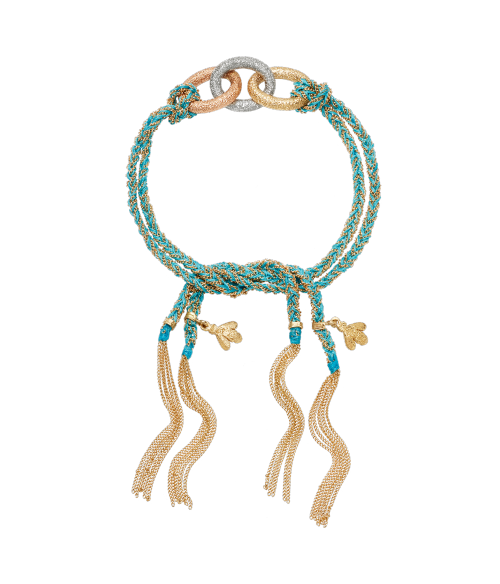 |
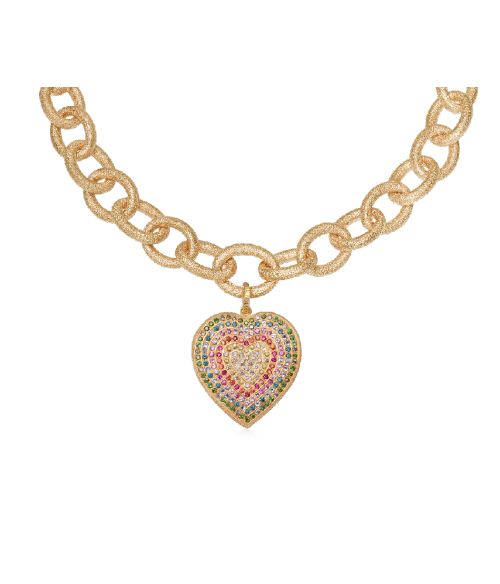 |
| 1885 Links Sprezzatura Lucky bracelet | A heart pendant in Rainbow Pave |
Tell us about a socially responsible project Carolina Bucci got involved
Recently it has been difficult to work out what, if anything, we should be doing as a business in the midst of this global health emergency. I have wondered, and still do some days, if it is not best to just hibernate and wait for the storm to pass? But, fundamentally, that doesn’t suit my nature. Like many, I have tried to stay creative and positive and to use the strengths of what we do to bring help in some way to those affected. Since March 15th we have been donating 25% of all sales from our online business to the Coronavirus Emergency Fund at Careggi Hospital in Florence, my hometown. And, at the same time, to help soothe tired minds and keep little fingers busy we launched a set of pages on our website to be printed off at home and coloured in or folded into origami shapes.
Can luxury and sustainability coexist?
Absolutely. In fact, I think true luxury is more likely to be sustainable than anything else. Luxury is handmade, by craftspeople that are skilled and well-paid. It considers its environmental footprint and chooses its materials and components carefully. I think the problem lies in the overuse of the word “luxury”- it has become somewhat meaningless.
How do you see the Carolina Bucci in 5 years?
To continue to grow the brand patiently and authentically building upon the firm foundations we have in Florence and the artisans that work for us there. We are looking now at opening a new store in the United States, and perhaps one in Italy. That and building out our online universe are the key areas for us in the next few years.
How do you recharge? What do you do when you want to forget about work?
The one place that I am able to really forget about work is at our house in Upstate NY. It is in the middle of the woods, with terrible Internet and cell reception – I love the chance to switch off, practice yoga, and pick fruit from our trees. Simple pleasures but two weeks there leaves me energised and ready for any new challenges.
What would you have done differently if you knew then what you know now?
When I was starting my brand in 2002…. I should have bought a lot of gold when it was trading at around $300/oz.
Finally, what is the piece of jewellery all women should own?
Something that reminds them of an amazing time or person. That is what jewellery does best. It can capture that emotion in something beautiful and lasting.
You can follow Carolina Bucci at @carolina_bucci
The WeGiveIt #WORLDCHANGERS series asks heroes, experts, and leaders to share their ambitions, routines and more.
We love to interview brands with purpose and listen about their work and their way of giving back. If you want to optimize your Cause Marketing check out how we can help.
I’m Alex Hatvany and I am your #EDUCATIONPRO
This week on the #YOURPRO series, we speak to Alex Hatvany, co-founder of Atom Learning, an innovative educational platform that is revolutionising the way of teaching using Artificial Intelligence algorithm.

Location: Soho, London
Current job: Co-founder Atom Learning
Your role model: Charlie Munger
My biggest fear: Churn
My favourite movie: The Social Network
First of all, tell us about you and your background
I met my co-founder, Jake O’Keeffe at university, where we lived together. Jake went into finance and I went to law school. I privately tutored throughout law school and when I started my Training Contract at a US law firm, I suggested to Jake that we begin a tutoring company. Every weekend, we put flyers through letterboxes in affluent parts of London to get the business going, offering our unemployed friends from Oxford as tutors. Jake worked on the business early in the morning and I helped at night after work and we’d both work on it over the weekend. As soon as I qualified as a solicitor, I quit my job – Jake had quit slightly earlier. the tutoring business allowed us to quit our jobs but we both knew we wanted to use the money we made from tuition to bootstrap a technology company.
When did you become passionate about education and get the idea of Atom Learning?
I’ve been interested in education since realising what a profound impact great teachers have had in my life. From the inspiring English teacher to the teacher who gave me the confidence to apply to Oxford, it all compounds into something very significant over time. The idea for Atom Learning came through operating a private tuition company. We determined Key Stage 2 (ages 8 – 11) is this incredibly important time in a child’s education in terms of laying the right foundations for future success. This area was almost entirely overlooked by ‘edtech’ that had traditionally focussed on older students. By combining the highest-quality teacher-made content with the technology that adapts to the individual child’s level, it is possible to automate the role of a private tutor, at least from an academic perspective. This is also far more scalable and has the potential for a genuinely positive impact on a massive scale.
Atom Learning uses an algorithm based on Artificial intelligence, how can this make a difference in education?
Put simply, it’s impossible for a human to determine the optimal learning path for an individual pupil and even more challenging in a class of many students. On Atom platform, our questions are initially graded on a difficulty scale by a professional teacher but questions are then re-graded by the hundreds of thousands of users to determine the questions actual difficulty level. This way you get a much more accurate understanding of a question’s difficulty level.
Atom will quickly understand the optimal probability a student should have of answering the next question correctly or incorrectly. We want students to be pushed but not to the point where it’s demotivating.
The results of adaptive learning are profound and not really discussed enough in my opinion. I believe even now, children are at a significant disadvantage from an attainment perspective if they’re not engaging with an adaptive learning platform and this will play a major role in the future of education. Below are some CAT4 data comparing Y5 and Y6 performance pre and post Atom at a leading prep school. I have permission to share this data but not the name of the school:
You are offering Atom Prime for schools and Atom Nucleus for parents, what is the Brand Strategy behind this?
Atom Prime is our school platform and this allows teachers to create lessons, homework, run mock tests and get performance insight. It is entirely free to use in school.
For parents who want to do additional work, they can use Atom Nucleus, our home platform, as a viable, school-supported and much more cost-effective alternative to a private tutor.
Where a platform is already used and endorsed by a school, this provides parents with the confidence to trial Atom Nucleus.
With that said, parent word-of-mouth travels even faster than teacher word-of-mouth. Many of our parents sign up directly to Atom Nucleus and are not part of the Prime community.
What Atom Learning wants to achieve in the next two years?
Atom has grown to around 100 employees and is still bootstrapped – we haven’t needed to raise any external investment yet and we’d like to keep it that way for as long as possible.
We believe we can 5x the number of incredible people we work with right now in the next 2 years so that we can continue building great features, enter new markets and pull away as one of the UK’s leading startups.
Digital is shifting the way to learn and teach, do you believe pen and paper are going to disappear?
I personally still like good old-fashioned pen and paper and I’m sure, I’m not alone in that but when I was at primary school, Snake on a Nokia 3310 was the latest in mobile gaming tech so I suspect the children using Atom today will be quite different.
A digital platform can be very useful but it lacks human connection, what do you think?
After a year of COVID, I’m very aware in-person is often nicer than remote. With that said, remote really does allow for much greater efficiency. A balance is the answer.
On Atom, if you’re ever missing a human connection, our incredible teachers James and Jono, are always available through our evening and holiday clubs. Many of their lessons are completely free to attend and we can have thousands in a single class. They’re incredibly good fun!
Tell us your trick to have a good work/free time balance in your day.
I haven’t got this right yet and COVID isn’t good for any workaholic! I think ultimately balance might be the wrong word. I’d like to achieve a work-life integration or harmony (like Jeff Bezos talks about) where one energises the other. The most important thing is that you love what you do and it’s giving you the energy to be a better person outside of work too.
Last but not least, a piece of advice to keep children academically engaged?
Absolutely, sign up for one of Jame and Jono’s free lessons – they’ll love it, I promise! https://app.atomlearning.co.uk/atom-clubs
Now please fill the gap about your 5 pro tips:
- A golden tip for a tech start-up: Don’t raise investment too early. Bootstrap for as long as possible – this will also force you to understand what your customers actually want.
- A sport to keep you fit: semi-embarrassing but I’m loving the Peloton at the moment.
- A game for your brain: start a company.
- Kindle vs PaperBook: paperback.
- Your favourite social media: I prefer to stay away but LinkedIn seems useful
You can follow Atom Learning on Instagram
At Wegiveit we help businesses to navigate the digital transformation by adjusting their Brand Strategy. Contact us to learn more.
I’m Thomas Hal Robson-Kanu of Turmeric Co and I’m a #WORLDCHANGER
This week on the #WORLDCHANGERS series, we speak to Thomas Hal Robson-Kanu, an international and premier league football player and founder of the Turmeric Co. – a company that produces a delicious range of functional natural turmeric shots.
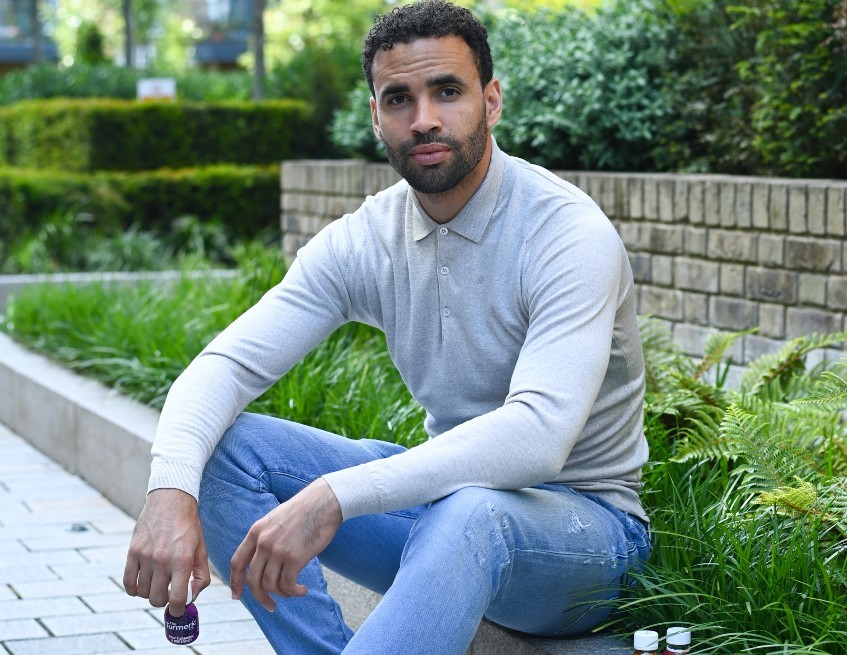
Location: Belgravia, London
Current job: Premier League football and CEO of The Turmeric Co.
One word that best describes how you work: Effective!
My role model: Dr Joe Dispenza
My greatest success: My family
My biggest fear: Snakes
Something I love: My family!
Something I hate: Sitting still!
First of all, tell us a little about your background and how you get the idea for The Turmeric Co?
As a kid, all I wanted was to be a footballer. I was well on my way to achieving this dream, but I had a huge setback. A terrible challenge left my knee totally shattered – at the time the doctors said it was unlikely I’d ever play at a professional level again. Naturally, I was devastated and became somewhat obsessed with finding a remedy. Especially since the painkillers, I was given had adverse side effects. So, I looked everywhere I could for a solution. Ideally a natural one. When I used the natural, raw root of the superfood, turmeric – within a unique blend that we developed as a family, the effects really were incredible. The inflammation in my injury totally subsided. I went on to have a successful career as a pro and am feeling fitter than ever and am now focused on helping as many people as I can with feel-good, functional nutrition.
Where does your passion for sport come from?
I’m naturally really competitive. Even from a young age, I’d race the other kids to lunch. I had to win at everything! So that definitely helped. But I guess I’ve always loved how the sport makes me feel. It’s an amazing way to be able to spend your time and express yourself and the joy it brings so many people around the world makes it a privilege to be experiencing this at the highest level of the game.
How was the transition from football player to entrepreneur?
For me, it was all really natural. I have so much belief in the benefits of the product we have created, so it doesn’t really feel like work. Every day I hear from people who have had positive experiences with our shots – it’s almost as thrilling as having fans chant your name but even more rewarding in the long run! It’s also great because I am able to really physically push myself while playing football, and then mentally push myself with the business, and they almost offset each other which allows me to really give my best in both.
Do you see ‘behaviour changing’ in people healthy lifestyle by paying more attention to their nutrition?
I think what we’ve seen over the past 40 years when it comes to attitudes toward exercise is just incredible. People didn’t use to run for leisure. Or have any idea that smoking was bad for you. Nowadays though, science and nutrition have come such a long way and people’s behaviours are certainly changing – just look at what the high streets look like compared to the 90s… But there is still a long way to go, and at The Turmeric Co., we are enjoying playing a role in that nutritional education of society. An example is, most people wouldn’t see an issue with a ‘health’ shot with its base ingredient apple juice, whereas for us, we would never put a filler such as concentrated apple juice in functional health shot as ultimately that is both high in sugar with very little added nutritional value, while also being a really cheap ingredient to use. These are some of the examples that we are committed to educating people in all walks of life on and that is why we are proud to say we offer the best natural health shot range on the market, because of the quality and the benefits every ingredient we use offers, and we do not want to shortchange our customers on this, we want to give them the best.
What do you think it’s essential to adjust a business in this unusual time?
Flexibility, empathy and drive! It’s been such a difficult time for so many people, but we’ve had the privilege of being able to help – by supporting the public’s natural well being with our shots and providing key workers with hundreds of free shots – to help them get through their toughest days. So being dynamic as a business is key, if you didn’t sell online and relied on stores to get your product into the hands of consumers, you will have needed to shift that model, so you are now able to deliver to your customers directly to their doorstep. If you didn’t focus on having a really strong brand and paid little attention to your customers and community, then you are going to lose customers because their purchasing patterns are changing, so you want to be communicating directly with them at every opportunity. But most of all, behind the scenes of every business, you want to be supporting your team and staff, as this time has been difficult for everyone and they are the ones keeping the engine room going, so start paying real close attention to your team on a human level.
Where do you see The Turmeric Co being in the next three years?
We are committed to continually bring the best quality range to our customers, and that means making sure every day we give our best, which is something we love doing. This ultimately will allow us to continue to bring functional nutrition to as many people as possible. Tens of thousands of people are now using our range daily, which is an incredible achievement in itself, given how new a concept a natural ‘health’ shot is still to people. So for me, it’s continuing to focus on the small wins each and every day, and this is what gives you the best opportunity for success.
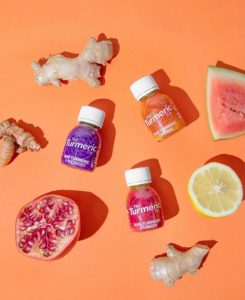
Do you have a cause that is close to your heart?
100%, I’m passionate around education for future generations. I feel the old models of education are outdated and because of technological innovation, the exchange of information, new information, is happening faster than ever. So for me, I want to play a positive role in creating an environment that shares information that wasn’t available to our grandparents and even our parents as this will inevitably lead to better lives and have a positive impact on society as a whole.
How do you recharge? What do you do when you want to forget about work?
Spending time at home with the family is when I feel most relaxed, whether that be in the evenings with my wife or on the weekends with the whole family. With a cup of turmeric tea, my feet up with the paper on a lazy Sunday – that’s when I get one off!
Best advice you would give to an aspiring entrepreneur just starting up their business?
Persevere! If I had listened to the doctors, I’d probably have never become a footballer. Had I not kept looking for a natural solution that’d help me fulfil my dreams, I’d never have started The Turmeric Co., let alone have become a professional athlete! If you’ve been knocked down… that’s great. Show us what you’ve got on the rebound!
If you knew then what you know now, what would you have done differently?
Nothing! Life is a journey full of experiences that are there to inform and guide us. Some will be harder than others, but you are never meant to stop learning.
Last but not least, can you suggest the best diet to have balanced nutrition?
I’m a firm believer in natural functional nutrition, and what I mean by that is nutrition with a purpose, not eating for the sake of eating, and understanding what you are putting into your body. It is empowering because it ultimately becomes a lifestyle change for the better when people commit to it. However, everyone is different, and no one nutritional plan will fit all, and therefore it is about trying what works for you and having self-awareness on the impact of what you put into your body, has on your energy, clarity and body. Nutrients act as building blocks that support every single function of the human body, when your nutrient deficient, these building blocks are weak or become damaged, causing a knock-on effect that leads to fatigue, stress and disease. As a rule of thumb, look for unprocessed foods which are nutritionally dense. Whether these be protein, carb or fat sources because you need them all.
You can follow The Turmeric Co on Instagram
We love to interview #WORLDCHANGERS and listen about their challenges and their achievements. We can help you analyze your Google Analytics data, in order to understand where your visits come from, who are your users and which are the most visited pages, providing bespoke reports on a specific period. After this deep analysis, we can support you to optimize your Brand Strategy to reach your business goals.
I’m Angela from Angela Wickstead Home and I’m a #WORLDCHANGER
This week on the #WORLDCHANGERS series, we speak to New Zeland-born Angela Wickstead, founder Angela Wickstead Home. a luxury sustainable brand that produces elegant bespoke homeware linens.
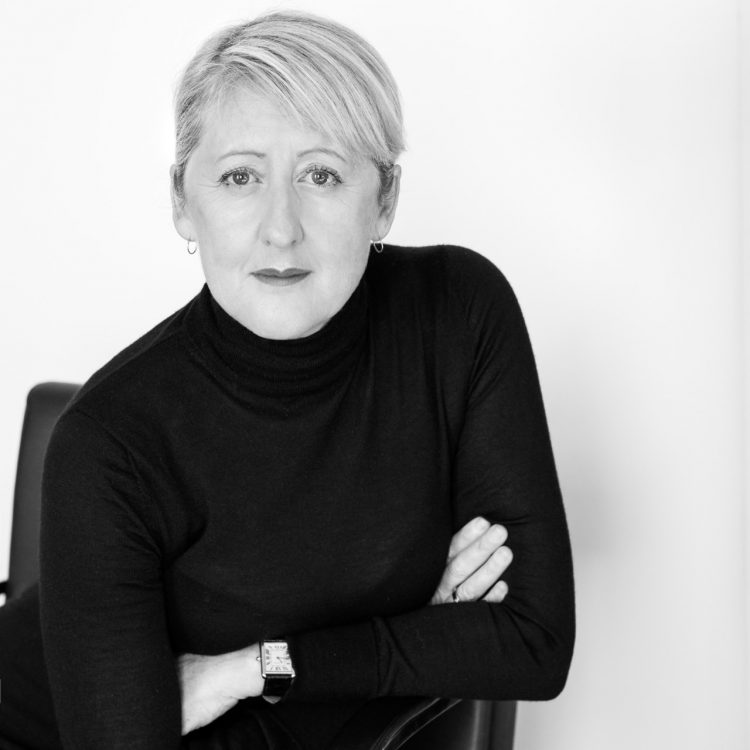
Location: South Kensington, London
Current job: Owner of Angela Wickstead Home
One word that best describes how you work: Passionately
Current mobile device: Iphone
Favourite website: MatchesFashion.com
First of all, tell us a little about your background and how you got to where you are today
I originally trained as an interior designer and then moved into fashion starting my own bespoke design company and stores. Then I moved to Italy from New Zealand in 1998. When my daughter Emilia started her clothing company years later I came on board to assist in a number of areas. After five years together I wanted to do something away from clothing and began working on building my new business from my home in Northern Italy. I always loved beautiful linen and found very little quality product available on the market. For this reason I started to design and produce embroidered homeware linens with monograms and fully bespoke.
How can you define your business ethical/sustainable?
I wanted my business to be 100% sustainable, all Italian made and from the best fabrics available, using only local artisan. After two and a half years I am proud to say that the brand is successful and growing at a steady pace.
I work with Italian family run and artisan based companies who are also passionate about their work. I believe in the authenticity and quality of the product and therefore I am more interested in the way the product is made than the volumes produced. Attention to details is very important and key to my products.
